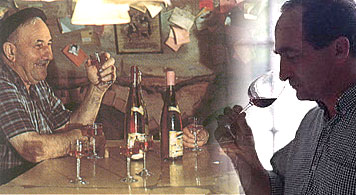 |

All day long we see, hear, feel, smell and taste. Most of the time we do so automatically: our senses react to stimuli in our surroundings, our minds barely aware of that reaction. When we taste wine we attempt to register consciously as many as possible of the sensations it has to offer, in order to increase our enjoyment and knowledge of it. Surprisingly, perhaps, this is not that complicated or difficult an art. It is simply a matter of building up a good memory-bank of wine tastes. You may not be able immediately to emulate those fictional connoisseurs who would say "Ah! Corton-Charlemagne — the '89 vintage," and add, crush-Tigly, "the south side of the vineyard" (this was easier in days past when all fine wine was French, apart from a little German hock). But you will soon learn to recognize the particular taste and smell of the Cabernet Sauvignon grape, whether it comes from Bordeaux or Bulgaria; the taste of a wine made in a hot country rather than a cooler one; and tell new wine from older. After that, apparently dizzying feats of memory become largely a matter of elimination. Learning how to taste enhances the pleasure we get from wine, and makes it possible to choose wine with care. An experienced taster can judge when a wine will be ready to drink, enabling the selection of immature wines for cellaring. Careful tasting also allows the recognition of the rare faults in wine. For tasting, you need three things: first, the skills to allow the efficient use of your senses, so that you can interpret the sensations of sight, smell, taste and touch that you experience as you taste. Second, a vocabulary with which you can describe your reactions. Third, a set of criteria by which you can judge what you have tasted. The skills are easy to learn, and the vocabulary, like any language, simply needs working at. You need time to develop standards so that you can make judgements that are more than purely subjective. This is because you need to taste a range of wines to acquire the necessary perspective. Anybody can become a good taster if they want to. Most of us are born with more or less the same capacity to taste, and although individual sensitivities may vary widely, winetasting depends much more on practice than on any natural gift. |
|
||||||||||||||||||||
